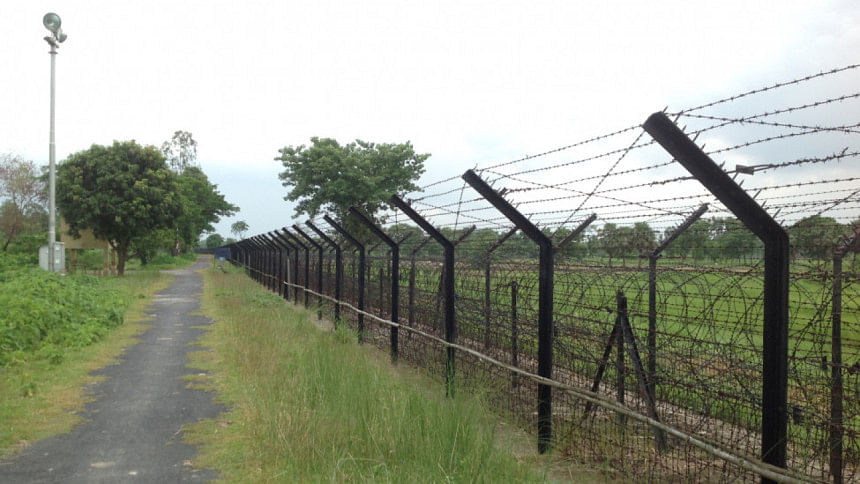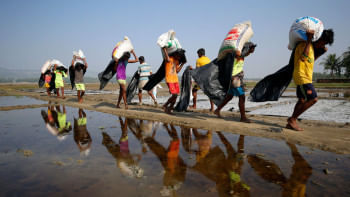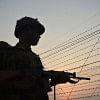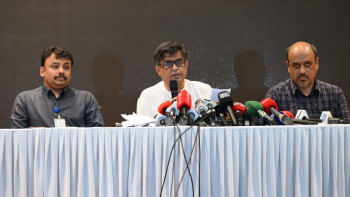Mending the line of blood on our border

Three hundred and five. That is the number of Bangladeshis killed by India's Border Security Force (BSF) in the last ten years, according to a recent report from the Human Rights Support Society. This is not a statistical anomaly. Our research, analysing dozens of these incidents, also reveals a horrifying policy that has turned a shared border into a line of impunity.
For too long, these deaths have been dismissed as isolated events, but the evidence points to a pattern of arbitrary and extrajudicial executions in what has been a sustained human rights crisis. When BSF personnel shoot and kill an individual, they act as judge, jury, and executioner. There are far too many examples of such unlawful border enforcement to recount here or to call them anything but state-sanctioned.
This brutality is enabled by a political narrative of dehumanisation that operates at every level. On the ground, victims are dismissed as "miscreants" or "criminals" to justify the violence. At the highest political levels, this is sanitised into bureaucratic language that is just as pernicious. When confronted about India's "pushback" of alleged Bangladeshi immigrants through the border, the country's Ministry of External Affairs deflected by citing a "pending list of 2,369 [Bangladeshi] nationals" and blaming Dhaka for verification delays. This rhetoric reduces thousands of human beings to a backlog to be "dealt with." Systematic dehumanisation doesn't just dull empathy; it creates the perfect conditions for border killings or illegal push-ins.
The erosion of restraint, then, is no accident. The BSF routinely defies the UN Basic Principles on the Use of Force and Firearms—an ethical framework built on necessity, proportionality, and accountability. Necessity demands that lethal means be a last resort. Proportionality forbids using a bullet to answer a transgression. Finally, the principles mandate robust accountability. Yet, we continue to see unchecked border aggressions and near-total absence of prosecutions, which suggest calculated neglect on the part of the BSF. We have documented various cases of torture. We have seen entire communities of Bangladeshi-origin Muslims in India have their homes bulldozed, be flown on military aircraft, and then dumped on a desolate island.
Each act of violence is swallowed by a ritual farce—outrage, denial, erasure. No inquiry. No justice. And with every unpunished killing, violence seeps deeper and becomes indistinguishable from policy. This systemic failure makes one thing painfully clear: the existing mechanisms for resolving border incidents have become a diplomatic charade, enabling rather than preventing the next tragedy. Even when Bangladeshi officials state plainly that "killings at the border can't be justified," the message fails to penetrate the BSF's operational doctrine. If the rule of law is to be restored, a radical overhaul is required, built on a new architecture of justice and prevention.
The centrepiece of this architecture, in my view, should be a standing binational commission on border incidents—radically distinct from existing consultative forums. This body should be composed of eminent, independent figures: retired senior judges, respected human rights commissioners, and security analysts of unimpeachable integrity from both nations. Crucially, active BSF or BGB commanders must be excluded to guarantee impartiality. This commission would be the central engine driving a comprehensive five-point strategy for lasting change. These five points are:
First, the commission would be the engine of truth. By conducting fully autonomous investigations, it would serve as the official bilateral counterpart to a UN Special Rapporteur, with its mandate backed by the United Nations Human Rights Council. This is not a radical demand. The UN has deployed similar mandates to investigate state-sanctioned border violence in Belarus, and the UN Rapporteur on Iran has specifically investigated shoot-to-kill policies against cross-border couriers. The crisis on the India-Bangladesh border warrants no less.
Second, the commission would be the engine of reform. Its mandate must include the authority to compel prosecutions in civilian courts, bypassing opaque military tribunals. This external, binding pressure is the only mechanism that can force a genuine overhaul of the BSF's Rules of Engagement to align with UN norms, tear down the walls of immunity protecting abusers, and ensure measures like body cameras are implemented meaningfully.
Third, the commission would be the engine of bilateral justice. Its binding rulings on victim compensation and criminal accountability would transform the dynamic from political negotiation to a quasi-judicial process, injecting the element currently absent: inescapable consequence.
Fourth and fifth, the commission's mandate would extend beyond adjudication to address the root causes of the crisis. Its investigations would provide both governments with authoritative reports on why people are crossing the border—to find work, visit relatives, flee police crackdowns, etc. From this evidence, it could issue formal recommendations to establish joint development programmes and, crucially, design and monitor the implementation of legal migration pathways, such as temporary work permits. This would undercut the traffickers who profit from desperation.
A nation's commitment to human rights is tested at its margins. Right now, at its eastern border, India is failing that test—one body at a time. Trust between nations is not built on the number of meetings held, but on the justice delivered. The time for empty rituals is over; the time for justice has come.
Maj (retd) Md Badrul Alam Siddiqui, PhD is head of operations at Millennium Certis Security Bangladesh Ltd. He can be reached at [email protected]. Views expressed in this article are the author's own.
Views expressed in this article are the author's own.
Follow The Daily Star Opinion on Facebook for the latest opinions, commentaries and analyses by experts and professionals. To contribute your article or letter to The Daily Star Opinion, see our guidelines for submission.

 For all latest news, follow The Daily Star's Google News channel.
For all latest news, follow The Daily Star's Google News channel. 








Comments